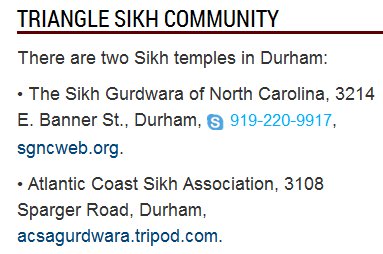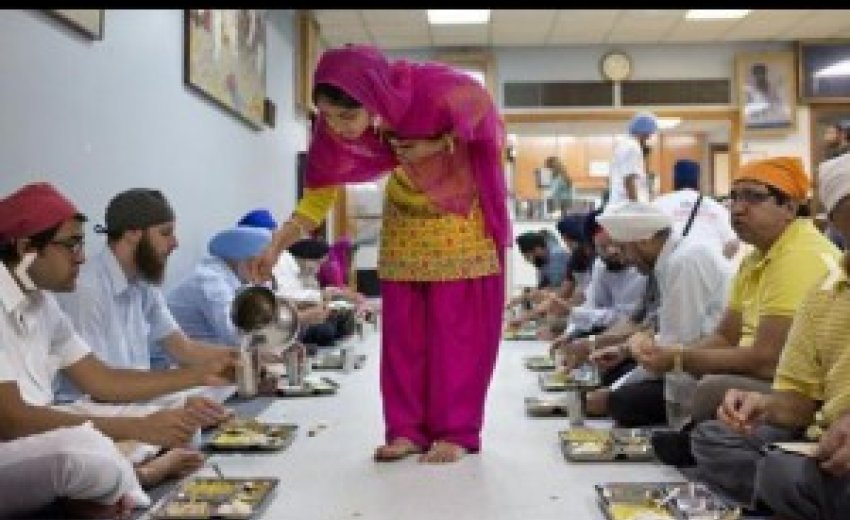
August 3, 2014: DURHAM — It has been almost two years since a white supremacist shot and killed six people and injured four more at a Sikh temple outside Milwaukee.
On Sunday, members of the Sikh Gurdwara of North Carolina, a temple off North Roxboro Road in Durham, marked the anniversary with a “day of seva,” or selfless community service, the first of what will likely become an annual tradition. Also this weekend, Sikh communities in California, New York, Georgia, Texas and elsewhere across the country fed the homeless, cleaned up parks and packed book bags with school supplies for children in need.
Sikh Gurdwara members collected cash and food donations Sunday for the Food Bank of Central and Eastern North Carolina. They decorated and signed a poster that will be sent to the Oak Creek Sikh temple, the site of the shooting. Children decorated artwork and wrote letters for the victims’ relatives.
Organizer Keerat Kaur, 19, of Cary, wearing a T-shirt that said, “We are all Sikhs, America Stands Together,” explained that she chose a food drive in honor of one of the victims. Paramjit Kaur, 41, the only woman killed in the incident, was known for preparing the communal meal after Sunday service at the Oak Creek Sikh temple.
About the shooting and its aftermath, Keerat Kaur said, “I think it brought the Sikh community together.”
 Originating in the Punjab region of northern India, Sikhism is the world’s fifth-largest religion. The religion’s core beliefs include equality, helping others, that there is one creator and that all people are free to practice their different faiths.
Originating in the Punjab region of northern India, Sikhism is the world’s fifth-largest religion. The religion’s core beliefs include equality, helping others, that there is one creator and that all people are free to practice their different faiths.
There are about 25 million Sikhs around the world and about half a million in the United States. In the Triangle, there are two Sikh temples, both in Durham. The Sikh Gurdwara draws between 300 and 400 members on busy Sundays.
Sikh men are forbidden by their religion to cut their hair, so they wear turbans in public. That has made them targets of misguided hate crimes since the Sept. 11 terrorist attacks.
Several temple members said the mistaken association stems from the common image of a bearded Osama bin Laden wearing a turban. In fact, the national Sikh Coalition was started after three Sikh men were attacked in Queens in what the coalition describes as a “reprisal” attack on the night of Sept. 11.
Eleven years later, on Aug. 5, 2012, Wade Michael Page, an Army veteran with white supremacist tattoos, started shooting at the Oak Creek temple and ended up taking his own life. Page’s motives are unknown, but many Sikh Gurdwara members believe it was an extension of the discrimination they have encountered since Sept. 11.
“It’s a misinterpretation of our look,” said Gurpreet Koura of Cary, referring to her “chunni,” or the traditional long scarf that covers her head. “We get that: ‘Go home. Terrorist. Osama.’ ”
The events that unfolded two years ago shocked this faith community, which prides itself on opening its doors to everyone. Every Sunday after service, Sikh temples serve a meal that is open to anyone in the community. Everyone sits on the floor, as a reflection on people’s equality, to eat the meal.
Instead of blaming outsiders for the shooting and the other incidents since Sept. 11, Koura said, “It’s our fault that we didn’t reach out and connect with them.”
Sunday’s food drive, Koura explained, “is just another way of reaching out to the community.”
The day of service was organized by Koura’s daughter and two other teenagers and offered them a valuable lesson, said Dr. Paramjeet Singh of Cary.
“That’s what the kids need to learn: to give to the community where they belong,” Singh said. “We don’t just give to the Sikhs.”
